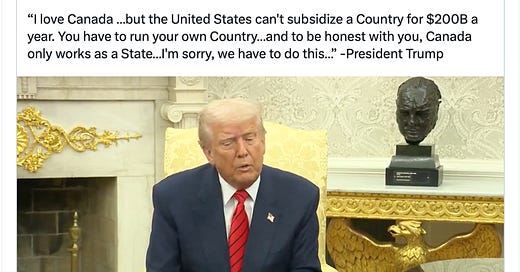Make American Free Trade Again Part 2: Do Not be Afraid of Trade Deficits
As a follow-up to my last post on free trade, I wanted to discuss one of President Trump’s most misunderstood aspects about trade: he views the U.S. having trade deficits as equivalent to a subsidy to those countries. He talks about trade deficits as if it is equivalent to foreign aid. He was quoted as saying that “the United States can’t subsidize a country for $200 billion a year… Canada only works as a state.” Taking the part about “Canada becoming a state” aside, Jeremy Horpedahl perfectly encapsulates why the trade deficit-as-subsidy argument is foolhardy.
If trade between the US and Canada were to stay the same after them becoming a state, the trade deficit would still exist. The simplest argument against this is thinking about an individual’s own “trade deficits.” For example, I have a very lobsided trade deficit with Whole Foods, Saba (my favorite New Orleans restaurant), and the producers of Woodford Reserve. Combined, I spend a few thousand dollars with them a year, and those greedy bastards have not once paid me once for anything! Am I getting ripped off? Of course not—I value their goods more than the money I used to purchase from them.
Similarly, Archbridge Institute (my full-time employer) has paid me since I was a part-time fellow with them starting in 2021. But I have yet to buy anything from Archbridge! Am I ripping them off? I sure don’t think so… I’d like to think the money they’ve paid me is a worthwhile investment 😉.
Taking this at a country level, protectionists argue that this does not translate since imports reduce GDP. At an accounting level, this argument makes sense if you are bad at accounting and basic economics. The GDP formula is Government Spending + Consumption Spending + Investment Spending + (Exports – Imports). At face value, it would seem as though the more we import, the lower our GDP. However, imports do not reduce GDP. They actually are not counted in GDP at all. The reason we subtract imports is because we count it already in consumption (or the other areas of GDP)— when I bought a Toyota Four-Runner, that increased consumption in US GDP. But since it was an import from Japan, we net it out of imports. The net effect? Zero. (Though its technically positive, since it increased GDP for the services paid to the salesperson/dealership). See Noah Smith’s piece on this, or Economic Force’s Substack for more details on why imports do not decrease GDP.
Having a negative balance of payments is not bad for a country’s economy. A simple scatter plot between the Balance of Payments and GDP per capita from 2000-2019 show no relationship. The R2 is 0.0015 (so, zero).
If anything, trade deficits are actually a good thing. One reason the U.S. has such a high trade deficit is because we are an incredibly rich country, which means we have more money to consume than most other countries, which means we buy a lot of goods and services internationally and within the country. Also, globally, the US dollar is strong, which makes it easier to buy goods from other countries. We get to trade pieces of paper for goods and services! This means producers in other countries get USD, and we get goods in return. Well, what does the producer of the good do with those dollars? They either 1) hold on to it, which boosts the value of the dollar, or 2) trade it in for their own currency, which makes its way back to the US either via investment or by buying goods from us. Either way, the US wins from this transaction.
On this latter point, a Cato Institute piece from last year pointed out that the US account deficit is basically mirrored by inflows in foreign direct investment. Again, this means that consumers in the US gets to doubly benefit from trade deficits: we receive cheaper goods, and in return, the country gets more investment in the country. This sounds like winning to me!
Source: Freytag and Levy (2024)
Trade deficits are not bad, despite what President Trump and his advisors might think. I would argue that if we want to “win so much that we get tired of winning”, we should embrace it.





